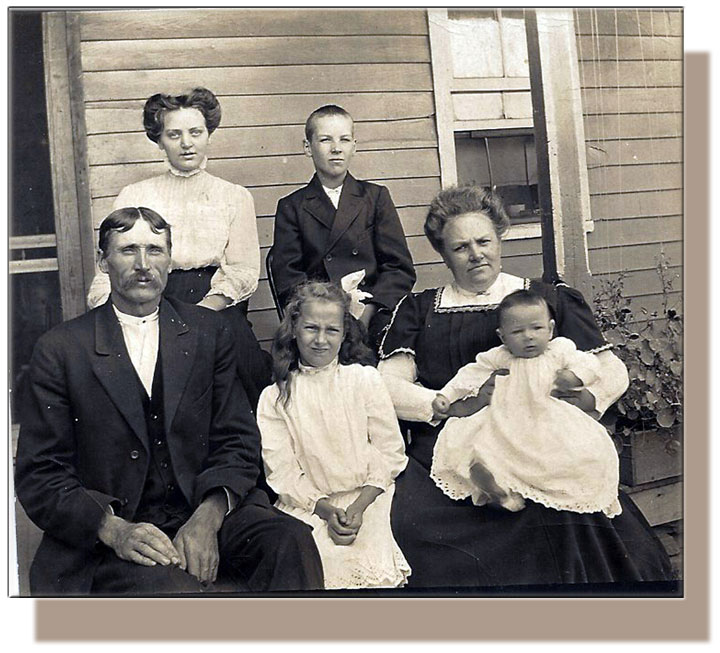 My Grandpa was a beekeeper. He kept bees in little white bungalows with a drawer at the bottom for wax combs and honey. Grandpa searched out bees in hollow trees and when he found them, dipped a roll of damp newspaper in gasoline and set it on fire to smoking. He put the paper inside the hollow tree and it confused the bees. They didn’t know what to do. We could see them flying in circles before they lit on Grandpa. They covered his head and arms, like a crawling long-sleeve shirt and hat. His eyes peeped through a mask that kissed his face. For the bees didn’t sting, Grandpa said, “because I’m not afraid.
My Grandpa was a beekeeper. He kept bees in little white bungalows with a drawer at the bottom for wax combs and honey. Grandpa searched out bees in hollow trees and when he found them, dipped a roll of damp newspaper in gasoline and set it on fire to smoking. He put the paper inside the hollow tree and it confused the bees. They didn’t know what to do. We could see them flying in circles before they lit on Grandpa. They covered his head and arms, like a crawling long-sleeve shirt and hat. His eyes peeped through a mask that kissed his face. For the bees didn’t sting, Grandpa said, “because I’m not afraid.
“And smoke makes bees calm,” he said. “It bee-wilders them.”
They buzzed when Grandpa reached his arm into the hollow tree. His hand came out with the Queen in his palm. She was long and waxy-white. I knew if bees could scream that hive of bees were for they circled Grandpa’s head before they sat on him again. I could hear them crying: “Oh Man, you touched our Queen!”
Grandpa drove their Queen home on the seat of his Plymouth car. When he got there, he set her inside an empty white bee bungalow. And all the other bees flew off Grandpa and settled about their Queen. “Anyplace their Queen is, is home,” said Grandpa. “An’ there’s no place like home.”
“Stop playing around with those damn bees!” Grandma shouted through her kitchen window over the sink. “You hafta be crazy doin’ with those creatures,” she said, but Grandpa, who loved his bees, kept on.
The day after, a bee stung my father on the hand. His eyes swelled way up and so did his throat. He fell down on the ground and couldn’t breathe, hardly, so Grandpa took him to the hospital in the very car that had carried his Queen-of-Bees. The doctors said my father was allergic and gave him a shot of something so he could breathe again. And when he could see, they sent him home.
When they reached Grandpa’s field of bees there was only a black patch where the village used to be, because before my eyes, Grandma burned Bee Town to the ground in a great conflagration.
“My bees!” Grandpa cried as he ran from the car. “You murdered my bees!”
“About time, too,” called Grandma from her window.
A few months later my father was called into the Army. He was stationed in Georgia and got poison ivy. He wrote from the hospital to tell us he was allergic. So the Army sent him to Texas.
He telephoned to say he was in the hospital again. “I’ve come down with poison oak,” he said.
So the Army sent him in Hawaii, where he developed jungle rot. He was in the hospital for a very long time after, and when he was cured, the government sent him home. I thought maybe they’d heard about Grandma’s murder of the bees.
My father and mother went shopping the day after he arrived. And when they came back my father carried a box into the house.
“You can’t look yet,” said my mother. “Close your eyes.”
When she said, “Open now!” my parents were looking at me hard as they pointed to two new shirts on hangers over our living room door.
The one on the right was light green to represent the sea. There were puckering white waves with black fish swimming below them. Men in fishing boats, with creels beside them, held onto fishing poles. One man in a red shirt, his fishing line taut, his pole bent like a hunting bow, was pulling a huge swordfish toward the boat.
The shirt on the left was bright yellow. It had coconut buttons and large white Hawaiian flowers like those you’d see in a Tarzan movie.
“Which one do you like the best?” my father asked. My parents’ eyes looked deep into me as if his question was the most important one any person had ever asked.
It really made no difference to me, but I pointed to the yellow shirt. And from that day my father was allergic to me. Following in the footsteps of his mother, he burned me to the ground every time our eyes met.
“My bees!” my Grandpa cried at Grandma. “You murdered my bees!” And in that very same way my father continually murdered me.

